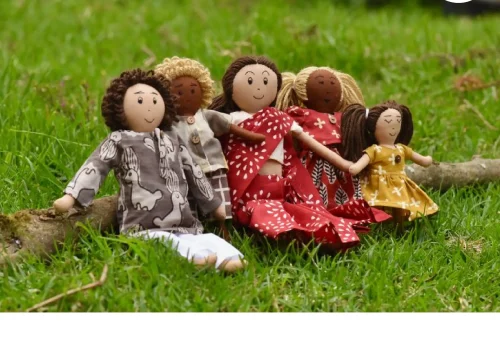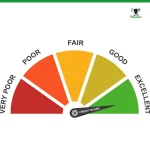Growing up in the 80s in West Bengal, Sunitha Rama Gowda desperately wanted to keep something in memory of her dadi (grandmother). Dadi used to make dolls out of old clothes or rags, which Sunita would lovingly carry with her throughout the day.
Sunita says that her startup 'The Good Gifts', which upcycles old clothes and makes fabric dolls, started from these memories.
“Our grandmothers used to make dolls out of old clothes, but with the advent of plastic, people stopped this practice. We took this age-old idea of making rag dolls and gave it a contemporary twist,” says Sunitha's husband Suhas Rama Gowda.
“We have designed the dolls in such a way that the clothes can be changed. These costumes are very detailed and give the child a real feel. "With different skin tones and facial expressions, children look at the dolls and dress them up as their ajja-ajji (grandmother and grandmother) and amma (mother)," he adds.
These dolls are good not only for the children but also for the society and provide employment to the tribal women artisans. Through the startup, Sunitha and Suhas have empowered 230 women from tribal communities in the Nilgiris of Tamil Nadu. Interestingly, The Good Gifts prevented 8,000 kg of textiles from being thrown away as waste.
After marriage, Suhas and Sunitha settled in Bengaluru and worked in the corporate sector for 15 years.
“But something was missing in our lives. We were not satisfied and had no purpose in the work we were doing. Could not find. So Sunitha and I decided to move to a rural area. We had enough of the hustle and bustle of city life and wanted to find what made us happy,” he says.
In 2017, the couple moved to the beautiful Nilgiris with a desire to live in a place surrounded by nature. “We built our house using soil with our own hands, started growing our own food, collected water from mountain streams and harnessed solar energy for electricity,” he shares.
As the couple transitioned to a sustainable and minimalist lifestyle, they also noticed that the same lifestyle was a struggle for rural communities. “Though we lived in the same environment, our lives were very different and stable because of our savings. But livelihood was a daily challenge for the tribals living here,” says Suhas.
“Other than picking tea, rural women had no other routine work. Every morning, they leave their homes and children to work in other villages,” she adds. It was then that the couple decided to do something for the neighboring community.
“Other than picking tea, rural women had no other routine work. Every morning, they leave their homes and children to work in other villages,” she adds. It was then that the couple decided to do something for the neighboring community.
Sunita explains how she always gravitated towards handicrafts. “Even when I was working, I always found time to embroider and crochet. I would research a lot about different crafts and learn how to make them from YouTube. It gave me the idea to bring women and craft together and see if we could create a solution around that,” she says.
Starting with patchwork, quilts and home decor products, the couple started training tribal women for it.
“Through upskilling and capacity building, we have tried to help women become entrepreneurs, not just factory workers. But training them is not enough. We needed market linkage and support to address livelihood issues,” shares Suhas.
This demand led to the formation of The Good Gift in early 2023. Acting as the marketing arm of Indian Yards Foundation, the startup promotes the economic empowerment of tribal women.
“We created a website to market the product. Everything is going smoothly, but we still haven't reached our hero product. So, we tried multiple products and finally settled on fabric dolls and toys,” says Sunitha.
"There is a growing segment that is moving away from plastic, and parents don't like their children playing with plastic toys as it is dangerous not only for the environment but also for our health," she adds.
Keeping sustainability as the brand's label, the couple strives to handcraft fabric dolls using upcycled textile waste. “Instead of buying new raw materials, we wanted to be as sustainable as possible. In garment factories, there is a lot of post-production waste and not all materials are used. So, we recover off-cuts from factories, bedsheets, cushions, excess material and fabric with wrong prints,” says Sunitha.
"Plastic Barbie dolls have created a certain beauty standard, for example the image of a certain shape, nose and certain colors. This creates wrong notions in the minds of children. We also want to change this perception. We promote body positivity, diversity of color and skin. After all, it is through these dolls that children learn about beauty standards,” she adds.
Within a year, the couple was able to expand their B2B operations and have a presence in 60 offline stores across Chennai, Bengaluru, Goa, Ooty and Cooner.
Every month they sell 3000 cloth dolls. Their income was Rs 75 lakh in the last financial year.
“Through this work we are happy to impart new skills and ensure financial benefits to tribal women. The cycle is complete only when women start earning money from it and not practice the craft as a hobby,” she says.
“Today, most of our women have increased their monthly income from Rs 2,000 to Rs 8-10,000. When we moved to the Nilgiris years ago, we did not expect this change to come. There is nothing more satisfying than that - says Sunita.






